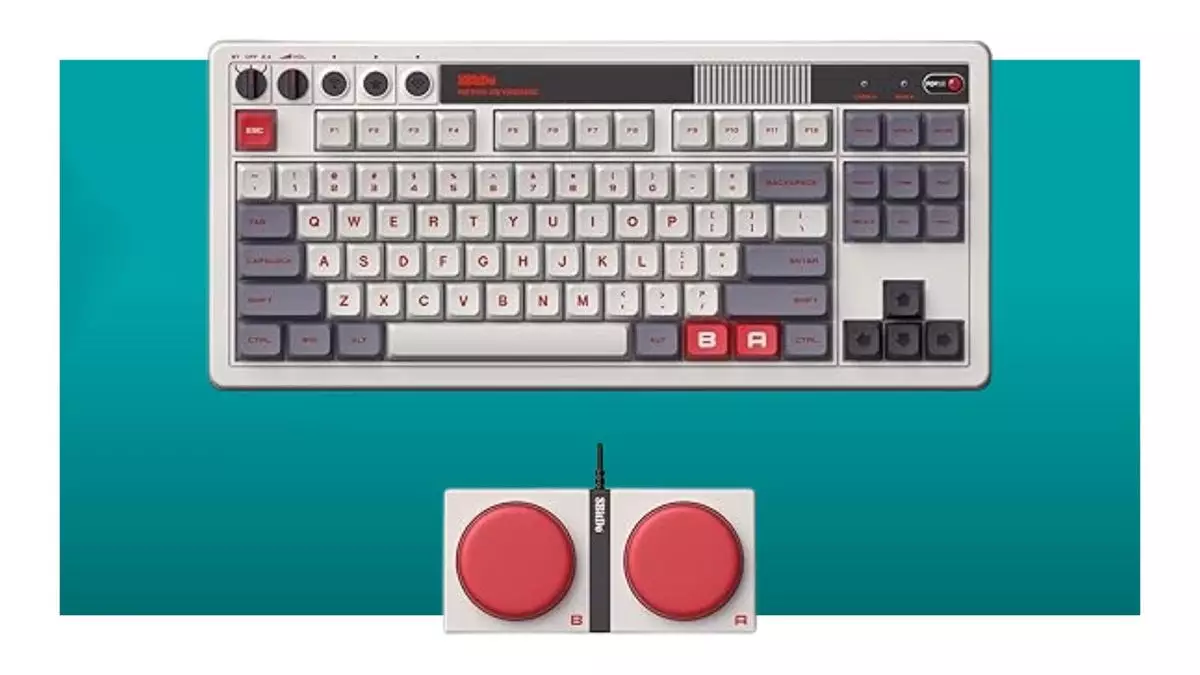In an era where keyboards not only serve as a tool for productivity but also as a canvas for expressing personal style, 8BitDo has successfully tapped into the deep reservoir of retro gaming nostalgia with its Retro Mechanical Keyboards. The aesthetic appeal is unmistakable — the carefully curated designs evoke memories of the beloved 8-bit gaming era, captivating fans who remember the thrill of playing classics on consoles like the NES and C64. These keyboards aren’t just visually striking; they’re an embodiment of the sentimentality associated with gaming history. However, while I see the value in advocating for this nostalgic flair, I wouldn’t advise shelling out extra for a keyboard simply because it echoes the look of your childhood.
Price and Aesthetic: A Comparative Overview
The price point of the 8BitDo’s C64 keyboard raises eyebrows, especially when the NES-themed counterpart retails for $80, which is a cool $20 less. For those on a budget, the NES version is quickly becoming the logical choice. You still receive the same mechanical features, including hot-swappable keys and a robust range of connectivity options, which are crucial for today’s diverse gaming setups. Aesthetically, the NES design features a clean white base contrasted with red, grey, and black accents, making it not only appealing but versatile enough to blend seamlessly into a modern workstation or gaming setup. In contrast, the C64 version features earth tones—browns and greys—that may be less universally appealing, setting the stage for a tough decision for potential buyers who simply love the retro design but don’t want to overpay for it.
Connectivity and Functionality: Options Galore
8BitDo’s Retro keyboards are packaged with connectivity options that would impress even the most discerning tech enthusiasts. The inclusion of 2.4 GHz wireless play, alongside Bluetooth capabilities for those less sensitive to latency, offers flexibility that many other keyboards might lack. A standout feature is the handy dial that allows for effortless switching between connectivity modes, demonstrating thoughtful engineering. This small but impactful addition enhances user experience, especially for gamers and creators who transition between platforms frequently.
The design also includes functional touches like a volume dial and a power light, which enhance its usability without compromising the overall aesthetic. The tactile feedback of the keys is satisfying, making the keyboard not only a beautiful accessory but also an effective tool for productivity and gaming alike.
Super Buttons: A Double-Edged Sword
However, the unique ‘Super Buttons’ are one of the design’s most peculiar elements. These programmable buttons add a layer of customizability that, while potentially advantageous, may not be critical for all users. Personally, I’ve found the Super Buttons to be a mixed blessing. My attempts at reprogramming have been rewarding enough that I’ve incorporated them into my workflow, yet I have often wished for broader functionalities. Unfortunately, the accompanying software feels somewhat limited and can hinder the user experience when striving for specific key combinations. The ability to record gameplay clips with just a press of a button is indeed useful but may not warrant the initial excitement that the marketing would suggest.
Balancing Performance and Nostalgia
On the performance front, 8BitDo does deliver a solid typing experience that satisfies daily tasks while allowing for comfortable gaming marathons. With an impressive battery life of up to 200 hours in Bluetooth mode, it’s hard to overlook the practicality of this feature, especially for gamers who prioritize uninterrupted gaming. After a month of use, I have noticed that the keyboard’s appeal lies not only in its nostalgic design but also in how it adapts to my daily routine, seamlessly taking its place alongside more expensive models without causing me to miss out on essential features.
In the end, while I’m enchanted by the aesthetics and nostalgic appeal of the 8BitDo Retro Mechanical Keyboards, it’s critical to evaluate their actual utility. It seems advisable to stick with the NES model if you’re hesitant about spending more. After all, sometimes it’s better to choose functionality and savings over mere extravagance for the sake of nostalgic flair.

